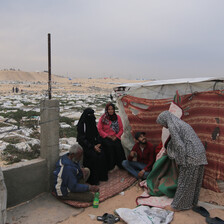The Electronic Intifada 10 November 2023

In this genocidal war, Israel has killed over 4,500 children, which comprises 40 percent of the entire death toll. (Abed Rahim Khatib / DPA via ZUMA Press)
The pregnant woman’s body was full of shrapnel from the same Israeli missile that killed her husband. She arrived at Gaza’s al-Shifa Hospital in a bad state and waited to hear the fate of their unborn child.
My friend Dr. Areej Hijazi, an obstetrician-gynecologist at al-Shifa, told me this story.
The woman, 22, was 28 weeks pregnant. She had to have her right leg amputated.
Her fractured left leg was stabilized with platinum plates and screws. Both of her arms were put into casts due to fractures.
She still had hope that nothing bad had happened to their unborn child.
Yet a sonogram confirmed that the baby had died.
The woman had no time to grieve. She was faced with two impossible choices, to either proceed with a painful stillborn birth or to undergo a C-section with limited anaesthetics.
Areej Hijazi did not know what the woman eventually chose. She had dozens of pregnant women to tend to in the emergency room at al-Shifa.
When she tells me this story, I think of lines from poet Mahmoud Darwish: “Give life to me … so I know in which land I will die and in which land I will be resurrected.”
Pregnant women are on their own
In this genocidal war, Israel has killed over 4,500 children, which comprises more than 40 percent of the entire death toll.
The number of children killed in Gaza by Israel in a single month has “surpassed the annual number of children killed across the world’s conflict zones since 2019,” according to Save the Children.
But this killing did not start in October 2023. It has a long history.
In April 1948, before the state of Israel had even been established, Zionist militias committed a massacre in the Palestinian village of Deir Yassin, killing women and children.
The massacres have continued in Gaza to this day, with children making up unconscionable proportions of those killed by Israel.
From 7 to 26 October, the Palestinian health ministry in Gaza reported that Israel had killed at least 132 babies who had not yet reached the age of 1.
Moreover, the premature newborns who rely on hospital incubators in Gaza are at risk of death at any moment if the electric generators are shut down due to a lack of fuel. And the lack of medications, especially surfactants, which facilitate breathing, put the newborns at risk.
Israel’s use of white phosphorus also poses incredible dangers to children. They can be severely burned and develop heart and respiratory problems.
And pregnant women’s exposure to white phosphorus increases the risk of birth defects.
Israel’s bombardments have also made it near impossible for pregnant women to receive perinatal care, which aims to detect and treat potential problems in the pregnancy. And with a lack of clean water, nutritious food and decent shelter, mothers and babies are at a higher risk for infections.
“I have nothing for the baby”
It’s estimated that there are 50,000 pregnant women in Gaza, and that 5,500 of them are anticipating November delivery dates.
This includes my friend Nadia.
Before 7 October, Nadia was already at risk for a complicated pregnancy.
Her previous pregnancy had not been easy. She endured many complications, including anaemia and high blood pressure, which pose serious risks to mother and child.
This October, Nadia fled her house to the south. She has not had access to clean water or adequate food supplies. She is distraught at how this will impact her future child.
“At any moment, my contractions can start,” Nadia said in a phone call. “I am extremely worried that I will have to go to a hospital in the south on foot while in pain. I have nothing for the baby. I did not bring anything, even clothes.”
She is also consumed with worry for what will happen after the baby is born. She is currently living in a crowded place.
How will she bathe her baby and change her diaper with no water available? How will she afford formula if she cannot breastfeed?
“Will there be any place for my daughter to receive her first-week vaccinations? If any problem occurs, like the jaundice that happened to my firstborn, where will I go? What will I do? Winter is at the door. How will I warm her?”
I barely had any words to console her. I urged her to stay optimistic and to pray that everything would settle down before she gave birth.
Nadia could not be consoled. “Why does [my baby] have to face this suffering the first moment she is on this earth?”
I am currently in Canada, where I work as a researcher in a lab that provides mental health support to asylum-seeking families and kids. I deeply sympathize with such children, who have faced so much en route to Canada.
But they are safe now.
I cannot say the same for the children in Gaza.
Sewar Elejla was formerly a doctor at al-Shifa Hospital in Gaza. She is now a Canada-based researcher.





